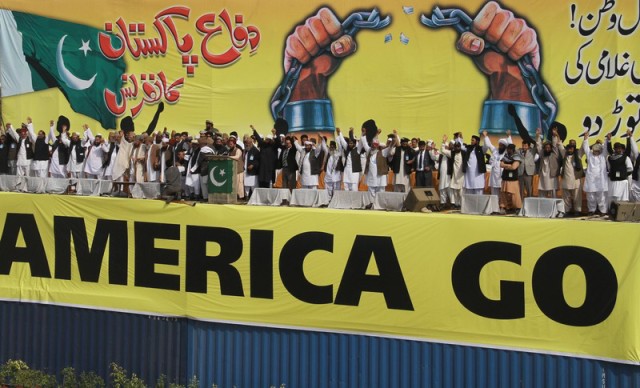A religious union by the name of Difa-e-Pakistan Council (Defence of Pakistan Council, DPC) has emerged as the representative of Pakistan's extreme right-wing parties. DPC is an umbrella term for 40 religious parties of different denominations. This group is a union of radical ideologies which is promoting radicalism in the Pakistani society.
According to DPC its primary aims are to prevent the Pakistan government from giving MFN (Most Favourite Nation) status to India, and secondly, a continuation on the ban of NATO (North Atlantic Treaty Organization) trucks from passing through Pakistan's soil to Afghanistan. Its Facebook page says:
“Difa-e-Pakistan” is a single point cause to defend Pakistan by all threats it faces internally and externally.

Local leaders of the DPC address the gathered religious groups protesting American foreign policy. Image by Majid Hussain. Copyright Demotix (12/2/2012)
The aforementioned primary goals go into delusion because the council contains banned groups such as LeT (Lasker-e-Taiba – The Army of Pure), JuD (Jamaaat-ud-Dawa – The party of Islamic Call) and SSP (Sipha-e-Sahaba – The army of Companions). These groups have an history of sectarian violence in Pakistan and are banned by law.
The very name of the council has also been criticised. For many, ‘Defence of Pakistan’ is a vague term which has little meaning whatsoever. Muhammed Rizwan plays with words by renaming Difa-e-Pakistan to “Defy Pakistan”. Hasan Nisar – a prominent newspaper columnist – questions in his column [ur]:
جغراقیائی دفاع؟ نظریاتی دفاع؟ روحانی دفاع؟ اقتصادی دفاع؟ سماجی دفاع؟
[What are they defending? Are they defending] Geography? Ideology? Spirituality? Economics? Society?
The blogger community criticised the role of DPC in Pakistan's Realpolitik. Criticising DPC's remark of besieging the parliment, Tazeen Javed writes that the overall effect of DPC would be chaos, anarchy and increase in suicide bombing. She writes that giving MFN status to India would reduce cross-border smuggling and foster better relations between the two countries. Isolating relationship with United States is nothing more than a Utopia as the country cannot survive with “this ultimate isolation”.
The DW's Blogwatch distils the the debate on Pak-US relationship by calling Pakistan “a nation in self-denial”. It can be implied that DPC has no knowledge of the current world order.
The orthodoxy show of power had zero percent presence of women in their rally. Women make up more than 50% of the country's population. S T Hussian writes:
It is interesting to note that women, who make up half the country’s population, are completely missing from these rallies. And the reason for that is that those who are part of the DPC would not consider women as equal members of society. Quite clearly, the views of those who make up the DPC are similar to those of the Taliban.
There are clues that DPC might not even believe in democratic principles. Rhetoric against democracy might lead to a political turmoil in Pakistan. Yaqub Javed of JuD commented:
We do not believe the current political system is Islamic and that is why we are not going to contest.
The next rally being organized by DPC is in the city of Peshawar. Formerly, they have conducted popular rallies in Karachi, Islamabad and Multan.
The civil society has criticised this growing trend. Mass protest was organized in Peshawar demanding a ban on the activities of Difa-e-Pakistan. It was appreciated across twitter:
@akbaralishah: Finally some people with courage have spoken !! All the banned outfits now come under one umbrella.
@Rubabaz: Sane voices, should be echoed from all over Pak.
#Peshawar civil society demands ban on#Difa-e-#Pakistan
@AroojZahra: Peshawar rocks: Civil society in Peshawar took to the streets and demands ban on Difa-e-Pakistan
@HassamKD: I stand corrected. We Rock – Peshawar civil society demands ban on Difa-e-Pakistan
With a proactive civil society which severely opposes extremism, the chances of Pakistan becoming a radical state are quite low. Abdul Majeed Abid writes:
It is the responsibility of the moderate elements of civil society to coalesce and try to control these elements [added: such as DPC] from going out of control by raising awareness and educating people. People should be educated about their role in a democracy. Efforts such as being done by Centre for Civic Education, PILDAT, Pakistan Youth Alliance, Teach for Pakistan and Youth Parliaments should be highlighted.






